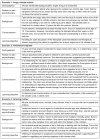Dealing with the climate crisis and eco-emotions in psychotherapy - a training for future medical and psychological psychotherapists using standardized patient scenarios
- PMID: 41103393
- PMCID: PMC12527395
- DOI: 10.3205/zma001776
Dealing with the climate crisis and eco-emotions in psychotherapy - a training for future medical and psychological psychotherapists using standardized patient scenarios
Abstract
Objectives: Practitioners and institutions have stated a need for training on how to work with patients who experience various forms of eco-emotions as an addition to existing curricula in psychotherapy training. Even though first suggestions for psychotherapeutic approaches to eco-emotions exist, these have not been translated into training concepts so far.
Methods: The aim of the presented project was to develop and implement a training on dealing with eco-emotions in psychotherapy, based on the framework of competency-based education. A one-day training was developed according to Kern's cycle. It consisted of i) a lecture, ii) three role-play scenarios with standardized patients, and iii) reflecting group discussions, and was offered three times to a total of n=23 medical and psychological psychotherapists in training at the Heidelberg Institute for Psychotherapy (HIP) in Heidelberg, Germany. The implementation was evaluated regarding feasibility, the educational strategies were evaluated regarding usefulness, and the effects of the training on a gain in competencies were evaluated through self-assessment.
Results: The implementation of the training showed to be feasible. Being an observer during the scenarios and being the acting therapist was ranked to be equally useful for gains in competency. Acceptance for all role play scenarios was high, and participants reported a significant gain in self-assessed competencies.
Implications: Training competencies in working with eco-emotions in psychotherapy is feasible and can be integrated into psychotherapy curricula. Competency-based education as a framework and the use of standardized patients are well suited to train participants in dealing with eco-emotions in psychotherapy.
Hintergrund: Sowohl Praktiker:innen als auch Institutionen haben einen Bedarf an Training für die Arbeit mit Patient:innen, die verschiedene Formen von Eco-Emotionen erleben, als Ergänzung zu den bestehenden Curricula in der Aus- und Weiterbildung von Psychotherapeut:innen geäußert. Obwohl es erste Vorschläge für psychotherapeutische Ansätze zu Eco-Emotionen gibt, sind diese bisher nicht in Trainingskonzepten umgesetzt worden.
Methode: Das Ziel des vorgestellten Projekts war die Entwicklung und Durchführung eines Trainings zum Umgang mit Eco-Emotionen in der Psychotherapie, das auf dem Rahmen des kompetenzbasierten Trainings beruht. Es wurde ein eintägiges Training nach dem Kern’schen Zyklus entwickelt. Es bestand aus i) einem Vortrag, ii) drei Rollenspielen mit standardisierten Patient:innen und iii) einer Fokusgruppe und wurde dreimal für insgesamt n=23 ärztliche und psychologische Psychotherapeut:innen in Aus- und Weiterbildung am Heidelberger Institut für Psychotherapie (HIP) in Heidelberg, Deutschland, angeboten. Die Implementierung wurde hinsichtlich der Durchführbarkeit evaluiert, die Trainingsstrategien wurden hinsichtlich ihrer Nützlichkeit bewertet und die Auswirkungen des Trainings auf den Kompetenzzuwachs wurden durch Selbsteinschätzung evaluiert.
Ergebnisse: Die Durchführung des Trainings erwies sich als realisierbar. Die Rolle des:der Beobachter:in während der Szenarien und die der handelnden Therapeut:innen wurden als gleichermaßen nützlich für den Kompetenzzuwachs eingestuft. Die Akzeptanz für alle Rollenspielszenarien war hoch, und die Teilnehmer:innen berichteten über einen deutlichen Zuwachs an selbst eingeschätzten Kompetenzen.
Schlussfolgerung: Der Erwerb von Kompetenzen im Umgang mit Eco-Emotionen in der Psychotherapie ist realisierbar und kann in Psychotherapie-Curricula integriert werden. Das kompetenzbasierte Training als Rahmen und der Einsatz von standardisierten Patient:innen sind gut geeignet, um Teilnehmer:innen im Umgang mit Eco-Emotionen in der Psychotherapie zu schulen.
Keywords: competency-based education; eco-anxiety; eco-emotions; psychotherapy training; standardized patients.
Copyright © 2025 Gebhardt et al.
Conflict of interest statement
The authors declare that they have no competing interests.
Figures
References
-
- Leiserowitz A, Maibach E, Rosenthal S, Kotcher J, Carman J, Verner M, Lee S, Ballew M, Uppalapati SS, Campbell E, Myers T, Goldberg M, Marlo J. Climate Change in the American Mind: Beliefs & Attitudes, December 2022. New Haven (CT): Yale University and George Mason University; 2023.
-
- Pihkala P. Anxiety and the ecological crisis: An analysis of eco-anxiety and climate anxiety. Sustainability. 2020;12(19):7836. doi: 10.3390/su12197836. - DOI
-
- Coffey Y, Bhullar N, Durkin J, Islam MS, Usher K. Understanding eco-anxiety: A systematic scoping review of current literature and identified knowledge gaps. J Clim Change Health. 2021;3:100047. doi: 10.1016/j.joclim.2021.100047. - DOI
-
- Hogg TL, Stanley SK, O’Brien LV, Wilson MS, Watsford CR. The Hogg Eco-Anxiety Scale: Development and validation of a multidimensional scale. Glob Environ Change. 2021;71:102391. doi: 10.1016/j.gloenvcha.2021.102391. - DOI
MeSH terms
LinkOut - more resources
Full Text Sources




